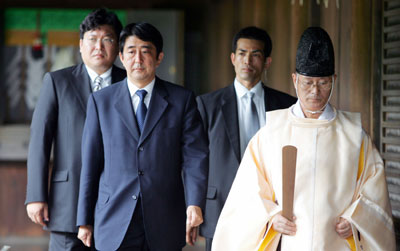China concerned over Abe's shrine visit
(Xinhua/Reuters)
Updated: 2006-08-04 22:03
BEIJING -- China on Friday expressed concern over reports that Japanese Chief
Cabinet Secretary Shinzo Abe visited the Yasukuni Shrine in April, Foreign
Ministry spokesman said.
"We hope that the Japanese side will make similar
efforts along with the Chinese side to push Sino-Japanese ties back to the track
of normal development at an early date," spokesman Qing Gang said while asked
for comments.
"It is a common aspiration of the two peoples and conforms with the
fundamental interest of the two countries for Japanese leaders to stop visiting
the Yasukuni Shrine, where World War II crimes were worshiped, and take tangible
action to eliminate political obstacles hindering the normal development of
Sino-Japanese relations," Qin said.
There are reports on Friday that Abe visited the Yasukuni Shrine in April 15
this year, where World War II crimes were worshiped.

Shinzo Abe (2nd L),
Japan's Chief Cabinet Secretary and front-runner to become Japan's next
prime minister, is led by a Shinto priest as he visits the controversial
Yasukuni Shrine in Tokyo to pay tribute to the war dead in this August 15,
2005 file photo. Abe made a secret pilgrimage earlier this year to the
Tokyo war shrine seen by China and South Korea as a symbol of Japan's past
militarism, media reports said on 4 August, 2006.
[Reuters] |
Abe neither confirmed nor denied
the reported visit, which would likely appeal to his conservative domestic
backers but risks further chilling ties with the two Asian countries, where
bitter memories of Japan's wartime aggression still run deep.
South
Korea's response was swift.
"It is disappointing and regrettable that
the sitting chief cabinet secretary has visited Yasukuni Shrine, where Class-A
war criminals are honoured," a South Korean foreign ministry official said in
Seoul.
"We stress that Japanese leaders must have a correct view of
history and good sense if they seek friendly relations in Asia."
Abe, a
soft-spoken security hawk known for his tough stance toward China and North
Korea, has backed Prime Minister Junichiro Koizumi's annual visits to the
Yasukuni Shrine.
Abe paid his respects there last August 15, the emotive
anniversary of Japan's surrender in World War Two.
The media reports
said he had gone again on April 15, after he was appointed chief cabinet
secretary last October.
In a nod to diplomatic concerns, Abe, has
declined to say whether he would visit the shrine if he succeeds Koizumi when he
steps down in September.
"As I have said many times at my news
conferences, I want to continue to have the feeling of showing respect by
praying for the repose of the souls of those who fought and died for their
country," Abe told a news conference on Friday.
"There is no change in
my feelings."
But he added: "In a situation where this issue has become
a diplomatic and political issue, I have no intention to state whether I have
gone, or will go."
Abe also said it was the government's view that
visits to the Shinto shrine by cabinet ministers in a private capacity did not
violate the separation of religion and state mandated by the constitution.
Tokyo's ties with Beijing and Seoul have deteriorated since Koizumi took
office in 2001 and began visiting the shrine, where Japanese wartime leaders
convicted as war criminals by an Allied tribunal are honoured along with the
country's 2.5 million war dead.
|